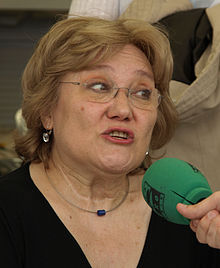Isabel-Clara Simó
Isabel-Clara Simó | |
|---|---|
 Isabel-Clara Simó in 2008 | |
| Born | 4 April 1943 Alcoi, Alicante, Spain |
| Died | 13 January 2020 (aged 76) Barcelona, Catalonia, Spain |
| Occupation | Writer, journalist, politician |
| Notable works | És quan miro que hi veig clar (1979) |
| Notable awards | Premi Víctor Català (1978) Premi Andròmina de narrativa (2001) Premi Sant Jordi de novel·la (2003) Premi de la Crítica dels Escriptors Valencians d'assaig (2004) Premi de Novel·la Ciutat d'Alzira (2007) Premi Trajectòria (2009) Premi Jaume Fuster dels Escriptors en Llengua Catalana (2013) Premi d'Honor de les Lletres Catalanes (2017) |
Isabel-Clara Simó i Monllor (4 April 1943 – 13 January 2020)[1] was a Spanish journalist and writer.[2] She is considered one of the most important writers in the Catalan language.[3]
Simó was awarded several prizes, including the in 1993. As a journalist, she was the director of Canigó magazine and had a daily column in the newspaper Avui. She was a delegate of the Culture Department of the Generalitat de Catalunya.[2][4]
Biography[]
Isabel-Clara Simó was BSc+MSc on Philosophy for the Universitat de València[5] and Journalism, and PhD on Romance Philology.[6] She taught at Bunyol and afterwards at the of Figueres, a town where her kids were born, and at the IES Sant Josep de Calasanç of Barcelona. She turned to journalism in 1972 as a director of the weekly Canigó and collaborated on a regular basis in several media. She created in her tales and novels a number of complex characters who have conflictive relationships, such as La Nati (1991), Raquel (1992), those from Històries perverses (1992) or those from T'imagines la vida sense ell? (2000). Some works as (1983) or (1987) was set on Alcoi, her birthplace.[7]
She was awarded the Sant Jordi prize in 1993, for La salvatge. She was deputy of Books for the Departament de Cultura of the Generalitat de Catalunya. In 1999 she received the Creu de Sant Jordi, for her career. The collection Dones (1997) was adapted to the cinema in 2000. She also published L'home que volava en el trapezi (2002) and her collection of articles at the journal Avui, titled En legítima defensa. She also had a great success, both from critics and audience, for her theatre piece Còmplices, taken to the scenarios by Pep Cortès.

In 1993 she won the for Històries perverses. In 2001 she received the for her work Hum... Rita!: L'home que ensumava dones, and in 2004 the Crítica dels Escriptors Valencians prize for her essay En legítima defensa. In 2007, she won the with .
As a journalist, she was director of the weekly , she wrote a number of articles for the journal Avui and nowadays for El Punt Avui.
In 2009 she was awarded the at the . According to the organization, this award recognizes the huge work of the writer and her effort in protecting the Catalan language.[8] In 2013, she received the Golden Medal of the City council of Alcoi, as well as its Key to the City.[7]
In 2017 she won the Premi d'Honor de les Lletres Catalanes.
Selected works[]
- Júlia (1983)
- D'Alcoi a Nova York (1988)
- La veïna (1990)
- La Nati (1991)
- Raquel (1992)
- Històries perverses (1992)
- La Salvatge (1994)
- Dones (1997)
- El gust amarg de la cervesa (1999)
- T'imagines la vida sense ell? (2000)
- Carta al meu nét. Sobre el nacionalisme (2000)
- La Nati (2001)
- Estimats homes (una caricatura) (2001)
- L'home que volava en el trapezi (2002)
- En legítima defensa (2003)
- Angelets (2004)
- Adeu-Suau (2006)
- El caníbal (2007)
- Un Tros de Cel (2012)
References[]
- ^ "Fallece la escritora Isabel-Clara Simó a los 76 años". 13 January 2020.
- ^ Jump up to: a b "Isabel-Clara Simó". escriptors.cat (in Catalan). Retrieved 13 September 2010.
- ^ Palmer, Judith (22 March 1996). "Judith Palmer on literature". The Independent, archived at LexisNexis. Retrieved 13 September 2010.
- ^ Diaz-Vicedo, Noèlia (February 2010). "Isabel-Clara Simó Monllor". Centre for the study of Contemporary Women's Writing. Institute of Germanic & Romance Studies, University of London. Archived from the original on 17 July 2011. Retrieved 13 September 2010.
- ^ Gran Enciclopèdia Catalana (ed.). "Isabel-Clara Simó i Monllor". L'Enciclopèdia.cat.
- ^ Generalitat de Catalunya website (ed.). "Qui és qui. Simó Monllor, Isabel-Clara". Archived from the original on 11 November 2013. Retrieved 11 November 2013.
- ^ Jump up to: a b "Alcoi concedirà la medalla d'or a Isabel-Clara Simó". VilaWeb. 9 February 2013. Retrieved 9 February 2013.
- ^ "Isabel-Clara Simó rep emocionada el Premi Trajectòria de la Setmana del Llibre a Sant Cugat". Cugat.cat Diari. 10 March 2009.
External links[]
 Media related to Isabel-Clara Simó i Monllor at Wikimedia Commons
Media related to Isabel-Clara Simó i Monllor at Wikimedia Commons
- 1943 births
- 2020 deaths
- People from Alcoy
- Writers from the Valencian Community
- Catalan-language writers
- Spanish women writers
- Spanish women journalists
- Women writers from Catalonia